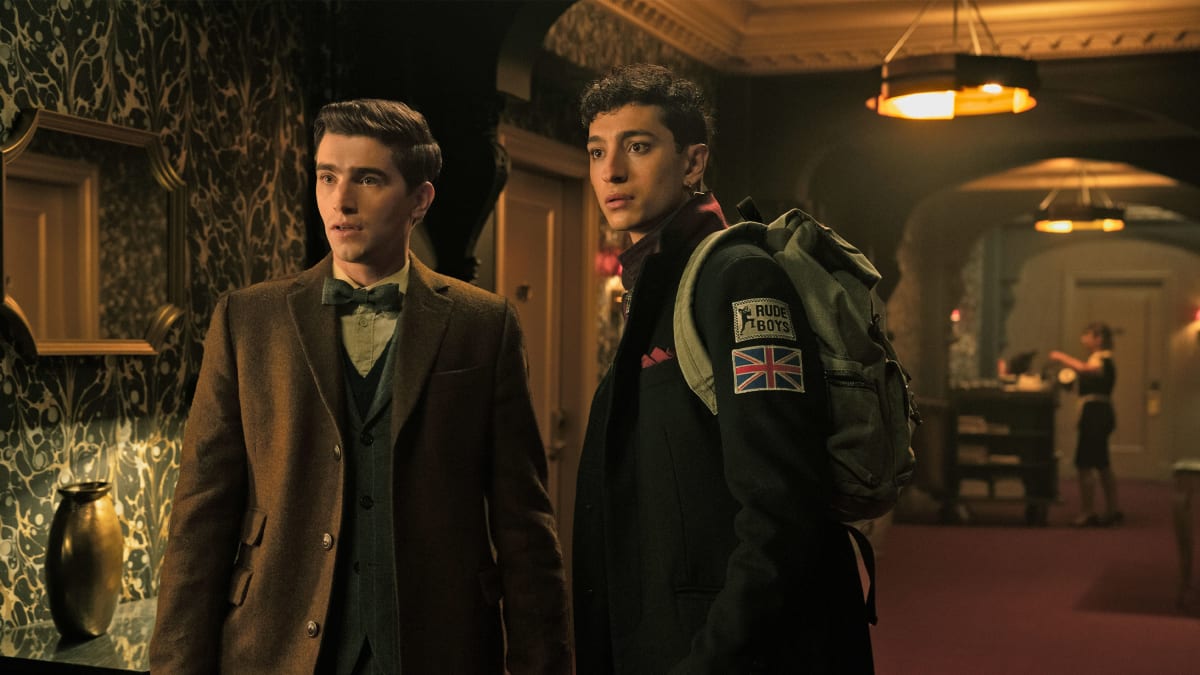Depending on your personal interpretation, you may subscribe to the notion of ghosts as unquiet spirits, haunting the realm of the living until some injustice they suffered in life or at the moment of their death is corrected, amended, forgiven. Ghosts, then, are the perfect clients for a certain type of private investigator motivated to simply provide closure to lost souls. It’s a heady intellectual conceit, and it’s also the hook that provides the backbone to , Netflix’s mystery series based on Neil Gaiman’s comic-book characters. And make no mistake: While there’s plenty of talk about life, death, and the afterlife, the show is light on its feet, a teen adventure series whose unquiet spirits are nothing compared to the trials of growing up—even if you’re already dead.
Prim and proper former English schoolboy Edwin Payne (George Rexstrew) and erstwhile streetwise punk Charles Rowland (Jayden Revri) are ghosts who have chosen to remain in the world of the living, solving ghost mysteries in order to send other spirits in need to whatever afterlife awaits them. The eight episodes of the first season take a throwback case-of-the-week approach, subtly building a season-long arc while its main characters are busy finding out how and why people died, whether that means breaking a curse, revealing some hidden treachery, or fighting a giant ectoplasmic toadstool. They’re joined in their quest by Crystal Palace (Kassius Nelson), a medium with a literally demonic ex-boyfriend, and Niko (Yuyu Kitamura), Crystal’s doe-eyed best friend with a sizable collection of anime boy posters on her walls.

Ed Araquel/Netflix
Being a Greg Berlanti production, it’s good, but you have to be on its wavelength. It’s a spinoff, but there’s less of The Sandman’s ethereal musings on the nature of life and death and dreams, and more of a teen-adventure-drama vibe, like a slightly more eldritch Scooby-Doo. It’s good in the way that (another Berlanti production) was “good”: It’s absurd, it’s melodramatic, and everyone’s delivering their parcel of gobbledygook lines in extra-heightened cadences. It also looks a lot like those shows, especially , another Netflix comic adaptation with a similar dimly-lit, misty atmosphere that immediately advertises the presence of witches and spells and the undead. (It also means you won’t be able to see this one in the daytime, either.)

David Bukach/Netflix
In the midst of rescue operations that require possessing strangers’ bodies or escaping the minions of Hell, these teens’ lives (and afterlives) are mainly dominated by crushes and relationships, using their ghostly cases as jumping-off points for dissecting past liaisons and present courtships. Edwin in particular, having lived and died in a time where giving off even a whiff of queerness would get you bullied to death at school, is preoccupied with his sexual identity—especially at the receiving end of heavy flirtations from the local Cat King (). It’s pure candy munchies for the fandom culture that surrounds these shows: Just because you’re dead doesn’t mean you can’t still be in love.
It’s also less beholden to its source material than other adaptations of this kind. The Dead Boy Detectives first showed up as side characters in an early arc of the Sandman comics, and have popped up now and again in a crossover event and single-issue one-shots, occasionally starring in their own miniseries or short-lived ongoing publications but never breaking big as main characters. That’s all well and good for the show, which takes the general bones of the characters and a few of their stories and fits them together into new beasts.
There are some small details that connect the show to the wider DC television universe: Kirby Howell-Baptiste reprises her Sandman role as Death for a short scene, loosely tying it to that other high-profile Netflix adaptation. It also includes Ruth Connell as the authoritarian Night Nurse, a character she played in an episode of Max’s , tasked by the bureaucratic organizations that run the afterlife with finding Edwin and Charles and putting them back where they belong. (The Dead Boy Detectives also appear in that Doom Patrol episode, but have been recast for this show.)

David Bukach/Netflix
But again, Dead Boy Detectives is wholly its own thing, and if it includes the little references and in-jokes we’ve come to expect from interconnected universes, they’re extremely minimal. The focus here is on the fun of following a cast of characters that so seamlessly fit into each other’s gaps. Charles and Edwin play off each other’s idiosyncrasies in ways that make you believe they’ve been childhood friends for decades. Crystal’s dagger-sharp smarts and desperation and Niko’s reserves of sly wit hidden underneath a moony exterior are welcome additions to the impromptu team. Death is frightening and strange, but Dead Boy Detectives finds a melancholy sort of fun in two ghosts still so full of life they refuse to let it go.
